Research projects
List of current research projects of the group:
The focus of A4 is on data science methods, which we apply and advance for different data types. First, hybrid techniques will be developed for generating an aggregate Origin-Destination (OD) travel demand based on high-frequency car travel time data. Second, cluster and classification algorithms will be developed to identify patterns in bicycle traffic using floating bicycle data. Third, we will develop methods to dealing with overlaps in the coverage of data and models. Fourth, we will investigate intra-personal travel routines, using sequence alignment methods with a particular focus on the effects of intra-household interactions.
This project is part of the Collaborative Research Center SFB/TRR 408 “AgiMo: Data-driven agile planning for responsible mobility”, that pursues an integrated approach on the mobility planning of the future.
Project Duration:
since 10/2025
Funded by:
DFG (German Research Foundation)
Contact:
 © Sebastian Dengel
© Sebastian Dengel
Research Associate (AgiMo)
NameMr Sebastian Dengel M.Sc.
Send encrypted email via the SecureMail portal (for TUD external users only).
Chair of Big Data Analytics in Transportation
Chair of Big Data Analytics in Transportation
Visiting address:
Bürozentrum Falkenbrunnen (FAL), Room 012 (Ground Floor) Würzburger Str. 35
01187 Dresden
Green hydrogen is widely regarded as one of the central building blocks of a sustainable energy transition. It should be considered that hydrogen is only produced sustainably or "green" if the electricity used for water electrolysis is exclusively generated from non-fossil (i.e., renewable or regenerative) energy sources such as photovoltaics, wind, or hydropower. To ensure the long-term economic viability of water electrolysis, primarily "surplus" energy should be used for hydrogen production. This means that hydrogen should be produced in particular at times when the energy demand (over a longer period of time) is lower than the available energy potential or supply.
To accurately forecast this "surplus" energy and thus use it as efficiently as possible, precise modeling of the respective energy supply and demand is required. When modeling the supply, the geographical location of the energy source and the sometimes very strong weather-related fluctuations must be considered. Conversely, energy demand is influenced, in particular, by demographic and industrial factors. Due to the high volume of data and the volatility of various time- and space-dependent influencing variables, the energy balance can so far - if at all - only be described with very specialized, highly complex models. At the same time, due to the high complexity of these models, a meaningful, i.e., comprehensible for humans, analysis of the algorithmically made decisions is almost impossible, so no statements can be made about the reliability of the models.
This is where the project proposal comes in. Through a suitable combination, adaptation, and extension of modern methods of artificial intelligence (AI), or more precisely, machine learning (ML), various algorithms and software products (with the primary goal of modeling energy supply and demand) are to be designed and implemented. First of all, an algorithm is to be developed with the help of which the enormous quantities of, in particular, time- and space-dependent data can be reduced completely automatically to the minimum possible quantity of informative influencing variables. Subsequently, this algorithm is to be integrated into a user-friendly AI system (also to be developed) called AutoGREEN, which - following the idea of so-called Automated Machine Learning - automatically selects the most suitable algorithm possible from a set of promising ML methods, with the help of which the energy supply and the associated energy demand (at a given location) are to be modeled. Due to the focus on models that were determined based on small, but as informative as possible influencing variables, this also provides the opportunity to specifically analyze the reliability of the generated models.
This project is part of Cluster E: Hydrogen Imports from the MENA Region Compared to Hydrogen Production in Germany of the 4th Boysen-TU Dresden-Research Training Group. The focus of this highly interdisciplinary RTG is on "Hydrogen Economy -- Strategic Element of a Future Greengas Deal".
Project Duration:
since 03/2022
Contact:
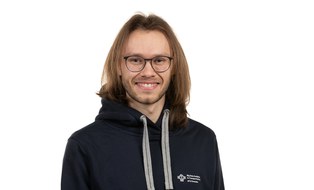 © Markus Leyser 04/2023
© Markus Leyser 04/2023
Research Associate
NameMr Markus Leyser M.Sc.
Send encrypted email via the SecureMail portal (for TUD external users only).
Chair of Big Data Analytics in Transportation
Chair of Big Data Analytics in Transportation
Visiting address:
Bürozentrum Falkenbrunnen (FAL), Room 011b (Ground Floor) Würzburger Str. 35
01187 Dresden
The rapidly increasing availability of traffic-related data enables new potentials in terms of monitoring, analyzing, optimizing, and planning transport systems. The Mobility Data Act being pursued at the federal and EU level will further accelerate this continuous data growth. Machine learning methods, such as cluster analysis, are increasingly being used to efficiently gain valuable information and insights from large volumes of data (keyword: big data). However, the current awareness and use of corresponding algorithms in transportation science (and its applications) has so far been very limited.
This FOSTER-funded project is pursuing a comprehensive analysis and systematization of cluster analysis methods and their known applications in the context of transportation science.
Project Duration:
03/2024 -- 09/2024
Contact:
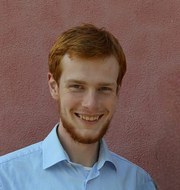
Graduate Student Assistant
NameMr Jochen Weihe B.Sc.
Send encrypted email via the SecureMail portal (for TUD external users only).
Chair of Big Data Analytics in Transportation
Chair of Big Data Analytics in Transportation
Visiting address:
Bürozentrum Falkenbrunnen (FAL), Room 120 (1st Floor) Würzburger Str. 35
01187 Dresden
The "RAS Problem Solving Competition" regularly calls for solutions to practical problems in rail transport. Methods from the fields of operations research, data analytics, and machine learning are used, all of which are key areas of my studies. The competition is organized by the Institute for Operations Research and the Management Sciences (INFORMS). The aim of this year's edition is to develop novel algorithms for more efficient shunting of rail cars in a marshalling yard. The underlying combinatorial problem is of great importance for rail freight transport. According to the organizers, only two companies worldwide offer modern AI-based methods for optimizing shunting processes. More efficient shunting of individual cars significantly increases the competitiveness of rail transport. This project thus makes an important academic contribution to the transport transition, as it supports the shift of freight transport from road to the more climate-friendly rail. The project team is currently developing a promising algorithm and will present the results in October at the “INFORMS Annual Meeting 2024” in Seattle, USA.
Project Duration:
10/2024
Funded by:
FOSTER – Funds for Student Research (TU Dresden)
Contact:
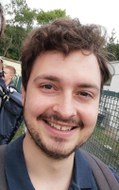 © Deutsch
© Deutsch
Graduate Student Assistant
NameMr Lukas Unterschütz B.Sc.
Send encrypted email via the SecureMail portal (for TUD external users only).
As a data competence center (DKZ), Come2Data pursues a Saxon-regional approach to imparting practice-oriented data skills primarily to science, but also to the areas of administration and interested society and, in the long term, to the economy. Come2Data bundles existing data science training and support services as well as expertise and commitment to research data management, NFDI, high-performance computing and analysis methods for data-intensive interdisciplinary research applications such as artificial intelligence and data modeling. The diverse local, regional and national activities that exist in Saxony will be consolidated and synergistically combined to create a sustainable offering. The basis for this is a comprehensive range of training and support services in the fields of data integration, data management, data analysis and data publication. Come2Data thus creates an open research, support, networking and learning location across Saxon locations in order to make the consolidated training, support and knowledge offer available to researchers, teachers and learners as well as to the public via a central virtual platform.
As an open learning location, Come2Data will bundle existing courses on data skills, prepare them didactically for different target groups and make them available centrally as module series and certification programs. The innovative aspect here is that real and complex data and teaching problems will be worked on by a Saxon data expert pool via the research locations and the resulting findings will be continuously incorporated into the courses on offer.
A sustainable support center will also be created around the research and learning location, which will provide extensive level 1 support in the form of a helpdesk using a knowledge base and specific level 2 support through the placement of experts. As an open networking location, these services will be available to a broad target group. In addition, Come2Data creates a space in which solutions for real data and teaching problems can be provided by tried and tested local, regional and national experts and made available in a didactic form.
Come2Data will provide the necessary technical and organizational infrastructure for this and, with the necessary human resources, will coordinate the data expert pool, the courses and the knowledge base, as well as enable the transfer of knowledge to the research sector.
The aim is to establish a Saxon data competence center that is closely linked to the existing activities and expertise in the context of NHR, AI and NFDI/RDM and uses the local and regional competencies of the Saxon data experts.
Project Duration:
since 11/2023
Funded by:
BMBF (Federal Ministry of Education and Research)
Contact:
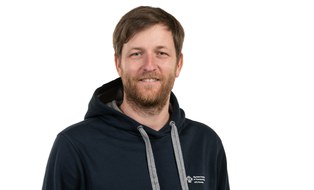 © Pascal Kerschke 04/2023
© Pascal Kerschke 04/2023
Professor
NameMr Prof. Dr. rer. pol. Pascal Kerschke
Send encrypted email via the SecureMail portal (for TUD external users only).
Chair of Big Data Analytics in Transportation
Chair of Big Data Analytics in Transportation
Visiting address:
Bürozentrum Falkenbrunnen (FAL), Room 005a (Ground Floor) Würzburger Str. 35
01187 Dresden
Office hours:
by appointment
Rail transport plays an extremely important role in the shift towards environmentally friendly mobility for people and goods. The high volume of rail traffic requires better real-time control systems to reduce delays after operational disruptions or cancellations and to ensure punctual and reliable rail transport. Future automated traffic management systems will use artificial intelligence (AI) to implement reliable scheduling decisions with very short response times after disruptions. However, there are still challenges to be overcome in order to use AI as efficiently and effectively as possible.
The REINFORCERAIL project is developing an AI-supported component for traffic management systems in rail operations. Initial trials have shown feasibility of AI-supported traffic management. Two methods will be investigated that will further improve automatic dispatching. On the one hand, neural networks will be used to identify which trains may need to be rescheduled at what time in the event of disruptions. On the other hand, AI agents will be combined with operations research methods to identify quality barriers and thereby promote the trust required for the implementation of a highly automated application.
The REINFORCERAIL project helps to make future traffic management systems more effective. The results of REINFORCERAIL will be incorporated into the current programs of the operators of the largest national European railway infrastructures in Germany (DB Netz) and France (SNCF) in order to improve and automate railway operations.
Project Duration:
since 06/2023
Funded by:
BMBF (Federal Ministry of Education and Research)
Contact:
 © Pascal Kerschke 04/2023
© Pascal Kerschke 04/2023
Professor
NameMr Prof. Dr. rer. pol. Pascal Kerschke
Send encrypted email via the SecureMail portal (for TUD external users only).
Chair of Big Data Analytics in Transportation
Chair of Big Data Analytics in Transportation
Visiting address:
Bürozentrum Falkenbrunnen (FAL), Room 005a (Ground Floor) Würzburger Str. 35
01187 Dresden
Office hours:
by appointment
Due to the rapidly growing volume of traffic data, in addition to the possibility of in-depth analysis, there is a need for a robust infrastructure to collect this data. As a consequence of theire dynamic temporal and spatial components traffic data are particularly extensive (big data). The Mobility Data Act, which is set to come into force in 2024, stipulates that “transport companies and mobility providers (...) must provide real-time data.” Dynamic data on the real-time availability of shared vehicles play a central role in this. While real-time data from shared mobility providers are already available on government platforms such as “Mobilithek” in some cases, this cannot be compared to the amount of data that is expected once the law comes into force. This project therefore focuses on developing a prototype framework that is capable of systematically collecting large amounts of real-time data on urban traffic flows from e-scooters (as an essential part of the shared mobility sector). Based on this, a comprehensive database is to be created that can be used for various analyses in transport and data sciences. The project thus serves as a pilot project for the collection, storage, and analysis of real-time traffic data—illustrated on the basis of all locations of an e-scooter provider in Germany.
Project Duration:
03/2023 - 07/2024
Funded by:
FOSTER – Funds for Student Research (TU Dresden)
Contact:
 © Sebastian Dengel
© Sebastian Dengel
Research Associate (AgiMo)
NameMr Sebastian Dengel M.Sc.
Send encrypted email via the SecureMail portal (for TUD external users only).
Chair of Big Data Analytics in Transportation
Chair of Big Data Analytics in Transportation
Visiting address:
Bürozentrum Falkenbrunnen (FAL), Room 012 (Ground Floor) Würzburger Str. 35
01187 Dresden
This project is funded by the DAAD funding programme for project-related personal exchange (PPP) in cooperation with Darrell Whitley's group at Colorado State University.
We aim to contribute to and ideally progress the state-of-the-art research for the traveling salesperson problem (TSP), one of the most fundamental and well-studied classes of NP-hard optimization problems (Applegate et al., 2011). Apart from the research challenges that the TSP still poses itself, it also serves as the basis for related routing problems such as the Vehicle Routing Problem (VRP) or the Traveling Thief Problem (TTP). Beyond that, it is also of great importance for numerous practical applications, such as manufacturing processes, logistics, or mobility.
Due to the long history of TSP research, there exist numerous algorithms for optimizing these problems. These are typically classified into groups: exact solvers and inexact heuristics. The former tend to be slower but guarantee the optimality of their found solution (if they terminate successfully). In contrast, the inexact TSP heuristics find the optimal tours on average much faster but cannot prove the optimality of their solution.
In recent years, both research groups involved in this project have contributed to different parts of the state of the art in solving the TSP using inexact heuristics. The U.S. partners have studied the convergence behavior of TSP algorithms (Varadarajan et al., 2020) and proposed a very powerful crossover operator that is able to efficiently recombine (locally optimal) tours to produce a less costly tour (Carvalho et al., 2019). Our group, in turn, has profound knowledge in characterizing the structures of TSP instances using measurable metrics, called features (Heins et al., 2022). Further, we have conducted extensive benchmark studies, in which we compared the performances of state-of-the-art TSP heuristics (EAX and LKH in particular) across different TSP instances, and used powerful machine learning algorithms to recommend the most promising heuristic for a given instance in an automated way based on its features (Kerschke et al., 2018).
This project will now consolidate the complementary expertise of the two international research groups and thereby (a) elucidate in detail the inner mechanics of the state-of-the-art TSP heuristics, including their numerous parameterizations, (b) improve the understanding of the interactions and effects of the configurable parameters, and (c) iteratively extend both state-of-the-art heuristics to ideally develop an even better performing (and thus resource-efficient) TSP heuristic.
References
Applegate, David L., Bixby, Robert E., Chvátal, Vašek, and Cook, William J. (2011). The Traveling Salesman Problem: A Computational Study. Princeton University Press.
de Carvalho, Ozeas Quevedo, Tinós, Renato, Whitley, Darrel, and Sanches, Danilo Sipoli (2019). A New Method for Identification of Recombining Components in the Generalized Partition Crossover. 8th Brazilian Conference on Intelligent Systems (BRACIS), pp. 36-41, IEEE.
Heins, Jonathan, Bossek, Jakob, Pohl, Janina, Seiler, Moritz, Trautmann, Heike, and Kerschke, Pascal (2022). A study on the effects of normalized TSP features for automated algorithm selection. Theoretical Computer Science, pp. 123-145, Elsevier.
Kerschke, Pascal, Kotthoff, Lars, Bossek, Jakob, Hoos, Holger H., and Trautmann, Heike (2018). Leveraging TSP Solver Complementarity through Machine Learning. Evolutionary Computation, pp. 597-620, MIT Press.
Varadarajan, Swetha, Whitley, Darrell, and Ochoa, Gabriela (2020). Why Many Travelling Salesman Problem Instances Are Easier Than You Think. Proceedings of the 2020 Genetic and Evolutionary Computation Conference (GECCO), pp. 254-262, ACM.
Laufzeit des Projektes:
01/2024 – 12/2025
Ansprechpartner:
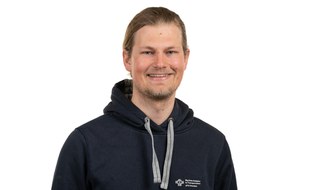 © Jonathan Heins 04/2023
© Jonathan Heins 04/2023
Research Associate
NameMr Jonathan Heins M.Sc.
Send encrypted email via the SecureMail portal (for TUD external users only).
Chair of Big Data Analytics in Transportation
Chair of Big Data Analytics in Transportation
Visiting address:
Bürozentrum Falkenbrunnen (FAL), Room 012 (Ground Floor) Würzburger Str. 35
01187 Dresden
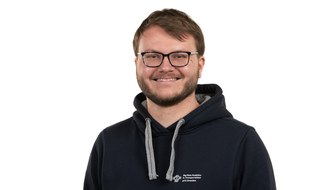 © Lennart Schäpermeier 04/2023
© Lennart Schäpermeier 04/2023
Research Associate
NameMr Lennart Schäpermeier M.Sc.
Send encrypted email via the SecureMail portal (for TUD external users only).
Chair of Big Data Analytics in Transportation
Chair of Big Data Analytics in Transportation
Visiting address:
Bürozentrum Falkenbrunnen (FAL), Room 011b (Ground Floor) Würzburger Str. 35
01187 Dresden
Office hours:
by appointment
